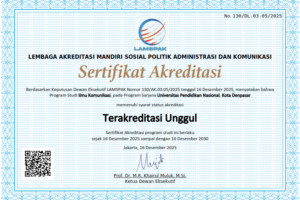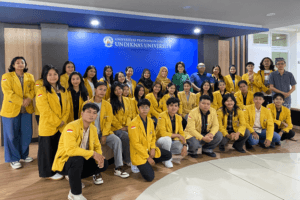
Local Elections in the COVID-19 Era: Important Lessons for Education and Democracy
Denpasar – In the era of the COVID-19 pandemic, education and democracy in Indonesia have faced extraordinary challenges. One significant moment of focus is the 2020 Regional Elections (Pilkada). Dr. Drs. I Nyoman Subanda, M.Si, a political observer and lecturer at Universitas Pendidikan Nasional (Undiknas) Denpasar, deeply elaborates on how the pandemic and the local elections are significantly interlinked and hold great relevance for learning, particularly in the field of education.
In an article, Dr. Subanda emphasized that in 2020, the local elections and COVID-19 became two inseparable phenomena. President Joko Widodo even stated that the quality of regional head candidates could be measured by their approach and commitment to handling the COVID-19 pandemic. This indicates that the leaders to be elected must possess high capability and concern in facing crisis situations like the pandemic.
Dr. Subanda outlines several key objectives of the local elections, including finding regional leaders who can realize community welfare programs and serve and empower the community. Additionally, the local elections are seen as a learning process for all parties. The public can learn to select leaders, participate in democracy, while the organizers can learn to be professional and independent.
In the context of education, lessons from the local elections can be integrated into higher education curricula. For example, through courses that teach about democracy, political participation, and leadership development. This will provide students with a better understanding of the importance of the democratic process and active participation in determining the nation’s future.
According to Dr. Subanda, the COVID-19 pandemic has imparted five crucial lessons for society and the educational world:
- Healthy Living Culture: The pandemic has underscored the importance of maintaining cleanliness and health. This valuable lesson can be integrated into health education programs in schools and universities.
- Economic Fragility: The pandemic has highlighted the vulnerability of global and national economies. This can encourage educational institutions to focus more on teaching about economic resilience and crisis management strategies.
- Longing for Social Interaction: The pandemic has made us realize the importance of social interaction. Education should adapt teaching methods that enhance social engagement and collaboration among students.
- Social Concern: The pandemic has emphasized the importance of solidarity and social concern. This can promote social programs in educational settings to increase awareness and social action among students.
- Leadership Quality: The pandemic has become a measure to assess the quality of leaders. Educational institutions can use this situation to teach the importance of responsive and responsible leadership.
From the perspectives provided, it is clear that local elections and the COVID-19 pandemic offer many relevant lessons for higher education. For instance, universities can develop curricula that teach crisis management, public policy, and leadership ethics. Furthermore, programs focusing on political and social sciences can utilize this situation as a real case study for learning.
Local elections in the COVID-19 era are not just about electing leaders but also about learning for society, especially in the educational context. As stated by Dr. Drs. I Nyoman Subanda, M.Si, the pandemic and local elections provide many valuable lessons that can enrich higher education curricula and strengthen the democratic process in Indonesia. In this year of 2024, reflections on past experiences become increasingly relevant and important for shaping future generations of leaders who are more resilient and responsive to crises.



